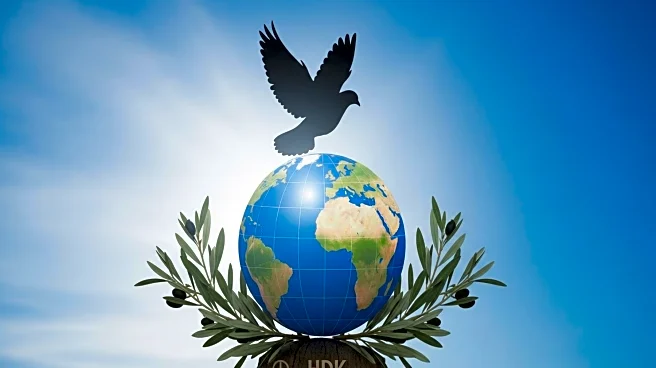What is the story about?
What's Happening?
World leaders at the United Nations are intensifying efforts to resolve the ongoing conflict in Sudan, which has resulted in a severe humanitarian crisis. Since mid-April 2023, tensions between Sudan's military and paramilitary commanders have escalated, leading to widespread violence and displacement. The conflict has claimed at least 40,000 lives, displaced nearly 13 million people, and left over 24 million acutely food insecure. In a significant development, the United States, Saudi Arabia, Egypt, and the United Arab Emirates have proposed a roadmap for peace, calling for a three-month humanitarian truce followed by a permanent ceasefire. The plan aims to establish an independent, civilian-led government within nine months. The African Union, European Union, and other international bodies are also involved in discussions to pressure Sudanese parties towards a ceasefire and political dialogue.
Why It's Important?
The conflict in Sudan represents one of the most severe humanitarian crises globally, with millions facing famine and displacement. The international community's involvement is crucial in facilitating peace and stability in the region. The proposed roadmap by influential countries could pave the way for a civilian-led government, potentially ending years of military rule and violence. Successful implementation of the truce and ceasefire could significantly improve the living conditions for millions of Sudanese citizens and restore regional stability. However, the challenge remains in convincing the warring parties to adhere to the proposed plan and cease hostilities.
What's Next?
The next steps involve convincing Sudan's warring factions to agree to the proposed truce and ceasefire. The international community, including the Quad and other stakeholders, will continue to exert pressure on the parties involved to resume direct negotiations. The success of these efforts will depend on the cooperation of Sudan's military and paramilitary leaders and their willingness to engage in political dialogue. Additionally, the international community must ensure that humanitarian aid reaches those in need during the truce period.
Beyond the Headlines
The conflict in Sudan highlights the complex interplay of regional politics and the influence of external actors. The involvement of foreign countries and non-state actors has exacerbated the situation, underscoring the need for a coordinated international response. The crisis also raises ethical questions about the responsibility of the global community in addressing human rights violations and supporting democratic transitions in conflict-ridden regions.
















